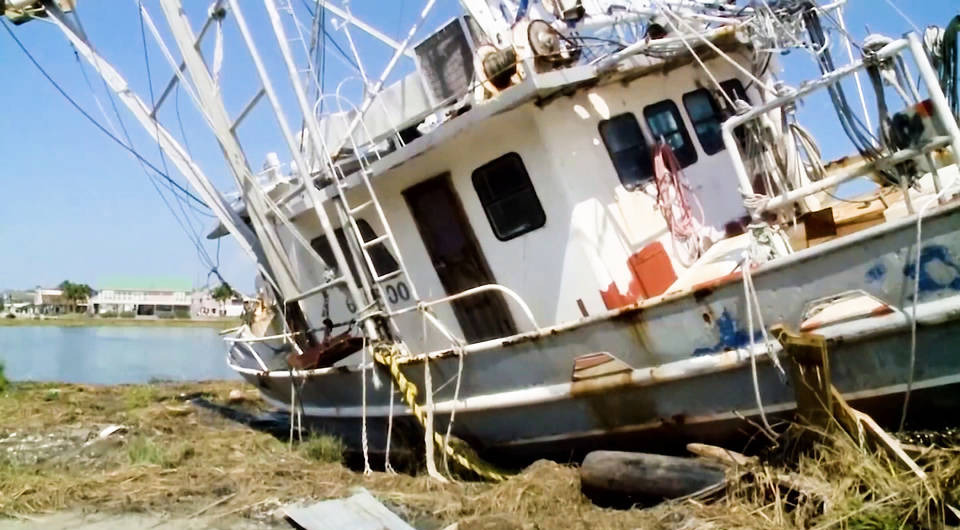
In some parts of Louisiana, where powerful Hurricane Ida made landfall on August 29, many homes damaged by the storm remain uninhabitable [Gerald Herbert/AP Photo]
New Orleans, September 9 (RHC)-- New Orleans has lifted a nightly curfew as the US city moves closer to regaining full power 10 days after Hurricane Ida, but hundreds of thousands of people outside the city were still without lights and water, and more than a quarter of a million children were unable to return to schools.
The city was left completely in the dark when Hurricane Ida slammed into the Louisiana coast with 240 kilometres per hour (150 miles per hour) winds on August 29th, cutting power to more than a million people statewide.
Two days later, New Orleans Police and Mayor LaToya Cantrell imposed a curfew from 8pm to 6am local time, citing cases of theft and other minor crime. They withdrew the order on Wednesday morning, but the police department said in a statement that it would maintain “increased and focused patrols throughout the city.”
Meanwhile, officials raised the state’s death toll from Ida to 26 on Wednesday, with the additional 11 deaths all occurring in New Orleans. The deaths happened between August 30 and September 6, but were just confirmed as storm-related by the Orleans Parish coroner, the state health department said.
Nine of the New Orleans deaths came from “excessive heat during an extended power outage” and involved people aged 64 to 79, the department said. The remaining two deaths involved carbon monoxide poisoning.
Louisiana’s Superintendent of Education Cade Brumley noted that 250,000 students were still unable to attend class because of the hurricane. Prior to Ida, schools around the state had been open despite widespread cases of COVID-19, although under a statewide mask mandate for all indoor locations. “We need to get those kids back with us as soon as we possibly can,” Brumley said.
In New Orleans, School Superintendent Henderson Lewis Jr said damage to schools appeared to be mostly minimal, but that power needs to be restored to all buildings, and teachers, staff and families need to return to the city.
“Now more than ever, our children stand to benefit from the comfort that structured and routine daily schooling can bring,” Lewis said in a statement. “So, let’s all come together to reopen our schools quickly and safely.”
Lewis said he expects classes for some will resume as early as next week and that all students will be back a week after that.
No school reopening estimates have been provided for the five parishes that were hardest hit by Hurricane Ida and which are home to about 320,000 people: Terrebonne, Lafourche, St James, St Charles and St John the Baptist. Ten days after the hurricane, 96 percent of utility customers in those parishes are still without power.
In the Terrebonne Parish city of Houma, bucket trucks with linemen were on every street, and as the day progressed, there were signs of progress as street lights began working on busy Grand Caillou road by early afternoon.
Even as power was coming on in parts of Terrebonne Parish, it was of limited use to Coy Verdin. The 52-year-old fisherman was staying at his son’s house in Houma after his own bayou-side home was all but destroyed in the storm.
“All the ceilings fell. You can see daylight through the roof,” Verdin said. “All we have is basically a shell.” Ida also scattered most of his 200 crab traps to parts unknown. “The only thing I have left is my boat and some of my commercial fishing rigging,” he said.
Statewide, crews have now restored power to 600,000 of the 902,000 who lost electricity at the peak of Hurricane Ida, Entergy Louisiana President and CEO Phillip May said on a Wednesday conference call with reporters.
Meanwhile in New Orleans, the power company expected to have 90 percent of the city back online by Wednesday evening, said Entergy New Orleans President and CEO Deanna Rodriguez. “The greater New Orleans area is coming back to life,” Rodriguez said.
May cautioned that some people who get power back on could still lose it at some point in the coming days. That is because the tree canopy was left severely damaged by Ida, and damaged limbs and branches still in trees could be shaken loose and fall.
Access to fuel was still dire on Wednesday, with the website GasBuddy.com reporting about 48 percent of gas stations in Baton Rouge had no gasoline. About 56 percent of stations in New Orleans were also dry.
About 62,000 people were still without running water in Louisiana, the state health department reported. That is significantly lower than the hundreds of thousands of people who had no water immediately after Ida’s landfall. Still, more than 580,000 people were being told to boil their water for safety.
In many neighborhoods, homes remain uninhabitable. About 3,200 people are in mass shelters around Louisiana, while another 25,000 people whose houses have been damaged are staying in hotel rooms through the Federal Emergency Management Agency’s transitional sheltering programme.

